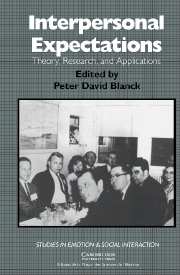Book contents
- Frontmatter
- Contents
- Preface
- List of contributors
- Introduction
- Part I Research on interpersonal expectations
- Part II Research on the mediation of interpersonal expectations through nonverbal behavior
- Part III The study of interpersonal expectations
- 17 The methodological imagination: Insoluble problems or investigable questions?
- 18 Issues in studying the mediation of expectancy effects: A taxonomy of expectancy situations
- 19 Analysis of variance in the study of interpersonal expectations: Theory testing, interaction effects, and effect sizes
- 20 Statistical tools for meta-analysis: From straightforward to esoteric
- 21 The volunteer problem revisited
- 22 Assessment and prevention of expectancy effects in community mental health studies
- 23 Comment: Never-ending nets of moderators and mediators
- Author index
- Subject index
- Studies in Emotion and Social Interaction
21 - The volunteer problem revisited
from Part III - The study of interpersonal expectations
Published online by Cambridge University Press: 23 December 2009
- Frontmatter
- Contents
- Preface
- List of contributors
- Introduction
- Part I Research on interpersonal expectations
- Part II Research on the mediation of interpersonal expectations through nonverbal behavior
- Part III The study of interpersonal expectations
- 17 The methodological imagination: Insoluble problems or investigable questions?
- 18 Issues in studying the mediation of expectancy effects: A taxonomy of expectancy situations
- 19 Analysis of variance in the study of interpersonal expectations: Theory testing, interaction effects, and effect sizes
- 20 Statistical tools for meta-analysis: From straightforward to esoteric
- 21 The volunteer problem revisited
- 22 Assessment and prevention of expectancy effects in community mental health studies
- 23 Comment: Never-ending nets of moderators and mediators
- Author index
- Subject index
- Studies in Emotion and Social Interaction
Summary
This chapter is a retrospective look at an early aspect of Bob Rosenthal's work and its implications for present-day research. The theme of this particular work was the characteristics of subjects who volunteer for research participation and the effects associated with their perception of the experimenter's expectations. For a number of years, Bob and I collaborated in research and reviews on this topic. Our initial aim was to discover in what ways volunteers were not representative of the population under investigation. We also sought to discover whether subjects who volunteered were more likely to acquiesce to cues they perceived as reflecting the experimenter's expectancies. Our investigation of these problems began in the 1960s (e.g., Rosenthal, 1965; Rosnow & Rosenthal, 1966) and culminated in the following decade with several syntheses (e.g., Rosnow & Rosenthal, 1976), including our monograph entitled The Volunteer Subject (Rosenthal & Rosnow, 1975).
I begin by focusing on the significance of the topic. I then summarize what we learned about the characteristics of volunteer subjects and turn to a sample of studies (by ourselves and others) in order to show the way in which volunteer status affected a variety of experimental outcomes. Next, I summarize our recommendations for lessening volunteer bias by increasing subject participation. In reviewing the characteristics of volunteers and the factors that stimulate participation, I also mention the degree of confidence that we believed was warranted by each set of conclusions. Finally, I allude to the delicate balance that exists between artifacts and ethics, a topic that has more recently occupied our attention (Rosenthal & Rosnow, 1984b, 1991; Rosnow, 1990; Suls & Rosnow, 1981).
- Type
- Chapter
- Information
- Interpersonal ExpectationsTheory, Research and Applications, pp. 418 - 436Publisher: Cambridge University PressPrint publication year: 1993
- 1
- Cited by



